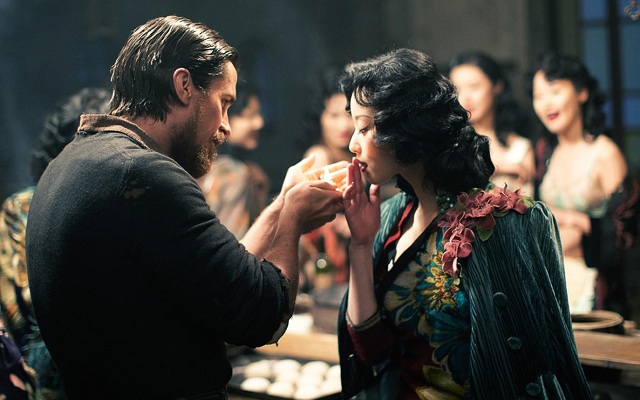
Director Yimou Zhang finds himself back in the director’s chair as he attempts to, once again, discover the form of his early career with the war drama The Flowers of War, starring Christian Bale.
Set during the 1937 Rape of Nanking. John Miller (Bale), an American mortician, arrives at a Catholic Church to prepare a recently deceased priest for burial. Deciding to spend the night in the Cathedral, he and the convent girls are joined by a group of prostitutes, led by the seductive Yo Mo (Ni Ni). As the Japanese Army presses further into the city, and into the Cathedral’s grounds, John takes on the role of their protector, posing as the church’s priest as he tries to find a way to help the women escape.
Opening with an explosive 15 minutes – filled with death, bloodshed and terror – Zhang does a fantastic job at setting the scene and the environment of where this story plays out. However, even with the shocking violence on show this, in my opinion, is a film about faith. Not so much faith in God and religion, but faith in humankind and that deep down, when put up against a wall, people are basically good. It shows the importance of morality in the most extreme of situations, with a gesture later on cementing that core sentiment.
And that gesture is just one of many memorable moments throughout the film, whether it’s one of quiet reflection or visual panache; they all leave their desired mark. The only problem being that Zhang connects these moments not with a dull story – it never gets close to being that – but a long-winded one. The director really does take the longest way possible to get his point across. Painting his story with broad strokes and taking time to set every scene, he doesn’t maintain that level of fear and threat up throughout. There are flashes, here and there, but not nearly enough than what was needed.
It also feels like it yearns to be epic, as if because it takes place in wartime it needs to have a certain amount of scale and grandeur. But unfortunately although the larger scale sequences are visually stunning and well played, they always seem to have a different tone from the rest of the film.
The Flowers of War works best when just focusing on Bale and the women in the church, and that’s all down to casting. Bale is as enigmatic as ever, always that ball of raw energy that you hope will never die out, and his chemistry with Ni Ni’s character is, for me, one of the stand out aspects of film. The Chinese actress in her first role, speaking in a language which is not her own, does an incredible job, her presence alone – sexy, confident, and when dealing with Bale’s character, completely in control – makes her magnetic whenever she’s on screen.
Unfortunately, The Flowers of War is not the film that sees Zhang return to top form; but don’t let fool you because it does, however, possess a hell of a lot of quality. Beautiful and touching, with an ending that is sure to leave a lump in your throat, it manages to capture humanity at both its best and worse.



